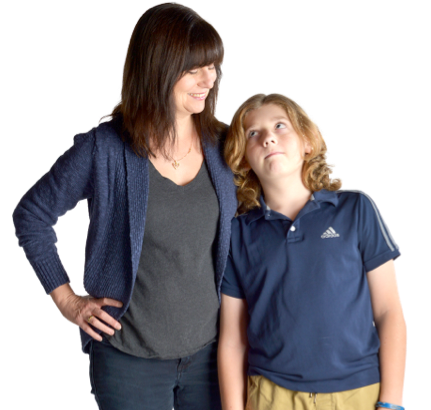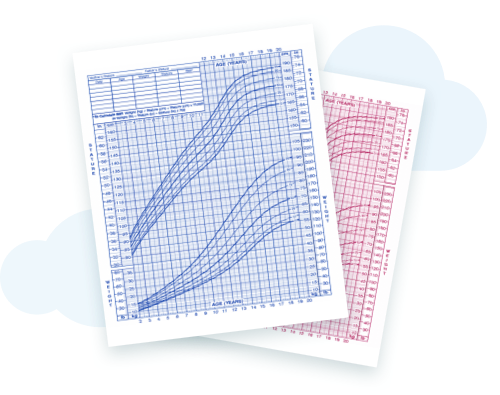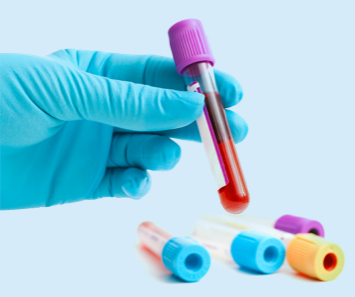Understanding Growth Disorders
Growth hormone deficiency in children
Actor portrayal

What is childhood growth hormone deficiency?
Growth hormone deficiency (GHD) means that the body does not make enough growth hormone. In children, growth hormone is necessary to help bones and other parts of the body grow. So children with GHD may not grow as quickly or fully as their peers.
Actor portrayal
Actor portrayal

What causes GHD?
There are many possible causes of GHD. In some cases, GHD results from a genetic disorder and is present at birth. In other cases, children can develop GHD after birth as a result of damage to the pituitary gland that secretes growth hormone, or it can develop without an identifiable cause. Sometimes GHD happens along with other hormone deficiencies, and sometimes it happens alone.
Josh, born with GHD

What are the signs of GHD in children?
Common signs of GHD in children include:
- Much shorter height than expected, based on the height of their biological parents
- A growth rate that slows and levels off over time
- Growth that is below the 2.3rd percentile (meaning more than 97.7% of children of the same age and sex are taller)
How is GHD diagnosed?
At first, a family doctor or pediatrician may check for other causes of poor growth, like diet or emotional stress. They may take measurements and use a growth chart to compare your child’s growth to other kids the same age and sex.
If a growth-related disorder is suspected, your child may be referred to a specialist called a pediatric endocrinologist. The specialist may use a combination of tests to confirm the diagnosis, such as:
- Blood tests
- X-rays or other imaging
- A stimulation test, or stim test


What’s the stim test?
A stim test measures the body’s ability to release the appropriate amount of growth hormone. The test involves artificially stimulating your child’s pituitary gland. Then your child has a series of blood tests, to see how much growth hormone their pituitary gland produces over a period of time.
After the diagnosis
Children diagnosed with GHD may be prescribed growth hormone therapy. This involves taking regular doses of growth hormone to make up for their deficiency and stimulate growth. Your child may have regular follow-up visits to monitor their growth and make sure that treatment is working well.
More resources for your journey
Advocacy and support for patients and families living with GHD
Actor portrayal
Norditropin® has been helping children with GHD since 1995
Want to learn about another condition?
Childhood GHD
Idiopathic short stature
Small for gestational age
Turner syndrome
Noonan syndrome
Prader-Willi syndrome
Adult GHD
Important Safety Information:
Do not use Norditropin® if:
- you have a critical illness caused by certain types of heart or stomach surgery, trauma or breathing (respiratory) problems
- you are a child with Prader-Willi syndrome who is severely obese or has breathing problems including sleep apnea (briefly stop breathing during sleep)
- you have cancer or other tumors
- you are allergic to somatropin or any of the ingredients in Norditropin®
- your healthcare provider tells you that you have certain types of eye problems caused by diabetes (diabetic retinopathy)
- you are a child with closed bone growth plates (epiphyses)
Before taking Norditropin®, tell your healthcare provider about all of your medical conditions, including if you:
- have had heart or stomach surgery, trauma or serious breathing (respiratory problems)
- have had a history of problems breathing while you sleep (sleep apnea)
- have or have had cancer or any tumor
- have diabetes
- are pregnant or breastfeeding, or plan to become pregnant or breastfeed
Tell your healthcare provider about all the medicines you take, including prescription and over-the-counter medicines, vitamins, and herbal supplements. Norditropin® may affect how other medicines work, and other medicines may affect how Norditropin® works.
How should I use Norditropin®?
- Use Norditropin® exactly as your health care provider tells you to.
- Do not share your Norditropin® pens and needles with another person even if the needle has been changed. You may give another person an infection or get an infection from them.
What are the possible side effects of Norditropin®?
Norditropin® may cause serious side effects, including:
- high risk of death in people who have critical illnesses because of heart or stomach surgery, trauma or serious breathing (respiratory) problems
- high risk of sudden death in children with Prader-Willi syndrome who are severely obese or have breathing problems including sleep apnea
- increased risk of growth of cancer or a tumor that is already present and increased risk of the return of cancer or a tumor in people who were treated with radiation to the brain or head as children and who developed low growth hormone problems. Contact the healthcare provider if you or your child start to have headaches, or have changes in behavior, changes in vision, or changes in moles, birthmarks, or the color of your skin
- new or worsening high blood sugar (hyperglycemia) or diabetes
- increase in pressure in the skull (intracranial hypertension). If you or your child has headaches, eye problems, nausea or vomiting, contact the healthcare provider
- serious allergic reactions. Get medical help right away if you or your child has the following symptoms: swelling of your face, lips, mouth, or tongue, trouble breathing, wheezing, severe itching, skin rashes, redness or swelling, dizziness or fainting, fast heartbeat or pounding in your chest, or sweating
- your body holding too much fluid (fluid retention) such as swelling in the hands and feet, pain in your joints or muscles or nerve problems that cause pain, burning, or tingling in the hands, arms, legs and feet. Tell your healthcare provider if you have any of these signs or symptoms of fluid retention
- decrease in a hormone called cortisol. Tell your or your child’s healthcare provider if you or your child has darkening of the skin, severe fatigue, dizziness, weakness, or weight loss
- decrease in thyroid hormone levels
- hip and knee pain or a limp in children (slipped capital femoral epiphysis). This may lead to a serious condition where bone tissue dies due to a lack of blood supply (osteonecrosis). Get medical help right away if your child develops a limp or has hip or knee pain
- worsening of curvature of the spine (scoliosis)
- severe and constant abdominal pain can be a sign of pancreatitis. Tell your or your child’s healthcare provider if you or your child has any new abdominal pain
- loss of fat and tissue weakness in the area of skin you inject
- increase in phosphorus, alkaline phosphatase, and parathyroid hormone levels in your blood
The most common side effects of Norditropin® include:
- injection site reactions and rashes, and headaches
Please click here for Norditropin® Prescribing Information.
Norditropin® is a prescription medication. You are encouraged to report negative side effects of prescription drugs to the FDA. Visit www.fda.gov/medwatch, or call 1-800-FDA-1088.
What is Norditropin®?
Norditropin® (somatropin) injection 5 mg, 10 mg, 15 mg, or 30 mg is a prescription medicine that contains human growth hormone, the same growth hormone made by the human body.
Norditropin® is given under the skin (subcutaneous) and is used to treat:
- children who are not growing because of low or no growth hormone
- children who are short (in stature) and who have Noonan syndrome, Turner syndrome, or were born small (small for gestational age-SGA) and have not caught-up in growth by age 2 to 4 years
- children who have Idiopathic Short Stature (ISS)
- children who are not growing who have Prader-Willi syndrome (PWS)
- adults who do not make enough growth hormone
What is Norditropin®?
Norditropin® (somatropin) injection 5 mg, 10 mg, 15 mg, or 30 mg is a prescription medicine that contains human growth hormone, the same growth hormone made by the human body.
Norditropin® is given under the skin (subcutaneous) and is used to treat:
- children who are not growing because of low or no growth hormone
- children who are short (in stature) and who have Noonan syndrome, Turner syndrome, or were born small (small for gestational age-SGA) and have not caught-up in growth by age 2 to 4 years
- children who have Idiopathic Short Stature (ISS)
- children who are not growing who have Prader-Willi syndrome (PWS)
- adults who do not make enough growth hormone
Important Safety Information:
Do not use Norditropin® if:
- you have a critical illness caused by certain types of heart or stomach surgery, trauma or breathing (respiratory) problems
- you are a child with Prader-Willi syndrome who is severely obese or has breathing problems including sleep apnea (briefly stop breathing during sleep)
- you have cancer or other tumors
- you are allergic to somatropin or any of the ingredients in Norditropin®
- your healthcare provider tells you that you have certain types of eye problems caused by diabetes (diabetic retinopathy)
- you are a child with closed bone growth plates (epiphyses)
Before taking Norditropin®, tell your healthcare provider about all of your medical conditions, including if you:
- have had heart or stomach surgery, trauma or serious breathing (respiratory problems)
- have had a history of problems breathing while you sleep (sleep apnea)
- have or have had cancer or any tumor
- have diabetes
- are pregnant or breastfeeding, or plan to become pregnant or breastfeed
Tell your healthcare provider about all the medicines you take, including prescription and over-the-counter medicines, vitamins, and herbal supplements. Norditropin® may affect how other medicines work, and other medicines may affect how Norditropin® works.
Important Safety Information:
Do not use Norditropin® if:
- you have a critical illness caused by certain types of heart or stomach surgery, trauma or breathing (respiratory) problems
- you are a child with Prader-Willi syndrome who is severely obese or has breathing problems including sleep apnea (briefly stop breathing during sleep)
- you have cancer or other tumors
- you are allergic to somatropin or any of the ingredients in Norditropin®
- your healthcare provider tells you that you have certain types of eye problems caused by diabetes (diabetic retinopathy)
- you are a child with closed bone growth plates (epiphyses)
Before taking Norditropin®, tell your healthcare provider about all of your medical conditions, including if you:
- have had heart or stomach surgery, trauma or serious breathing (respiratory problems)
- have had a history of problems breathing while you sleep (sleep apnea)
- have or have had cancer or any tumor
- have diabetes
- are pregnant or breastfeeding, or plan to become pregnant or breastfeed
Tell your healthcare provider about all the medicines you take, including prescription and over-the-counter medicines, vitamins, and herbal supplements. Norditropin® may affect how other medicines work, and other medicines may affect how Norditropin® works.
How should I use Norditropin®?
- Use Norditropin® exactly as your health care provider tells you to.
- Do not share your Norditropin® pens and needles with another person even if the needle has been changed. You may give another person an infection or get an infection from them.
What are the possible side effects of Norditropin®?
Norditropin® may cause serious side effects, including:
- high risk of death in people who have critical illnesses because of heart or stomach surgery, trauma or serious breathing (respiratory) problems
- high risk of sudden death in children with Prader-Willi syndrome who are severely obese or have breathing problems including sleep apnea
- increased risk of growth of cancer or a tumor that is already present and increased risk of the return of cancer or a tumor in people who were treated with radiation to the brain or head as children and who developed low growth hormone problems. Contact the healthcare provider if you or your child start to have headaches, or have changes in behavior, changes in vision, or changes in moles, birthmarks, or the color of your skin
- new or worsening high blood sugar (hyperglycemia) or diabetes
- increase in pressure in the skull (intracranial hypertension). If you or your child has headaches, eye problems, nausea or vomiting, contact the healthcare provider
- serious allergic reactions. Get medical help right away if you or your child has the following symptoms: swelling of your face, lips, mouth, or tongue, trouble breathing, wheezing, severe itching, skin rashes, redness or swelling, dizziness or fainting, fast heartbeat or pounding in your chest, or sweating
- your body holding too much fluid (fluid retention) such as swelling in the hands and feet, pain in your joints or muscles or nerve problems that cause pain, burning, or tingling in the hands, arms, legs and feet. Tell your healthcare provider if you have any of these signs or symptoms of fluid retention
- decrease in a hormone called cortisol. Tell your or your child’s healthcare provider if you or your child has darkening of the skin, severe fatigue, dizziness, weakness, or weight loss
- decrease in thyroid hormone levels
- hip and knee pain or a limp in children (slipped capital femoral epiphysis). This may lead to a serious condition where bone tissue dies due to a lack of blood supply (osteonecrosis). Get medical help right away if your child develops a limp or has hip or knee pain
- worsening of curvature of the spine (scoliosis)
- severe and constant abdominal pain can be a sign of pancreatitis. Tell your or your child’s healthcare provider if you or your child has any new abdominal pain
- loss of fat and tissue weakness in the area of skin you inject
- increase in phosphorus, alkaline phosphatase, and parathyroid hormone levels in your blood
The most common side effects of Norditropin® include:
- injection site reactions and rashes, and headaches
Please click here for Norditropin® Prescribing Information.
Norditropin® is a prescription medication. You are encouraged to report negative side effects of prescription drugs to the FDA. Visit www.fda.gov/medwatch, or call 1-800-FDA-1088.
What is Norditropin®?
Norditropin® (somatropin) injection 5 mg, 10 mg, 15 mg, or 30 mg is a prescription medicine that contains human growth hormone, the same growth hormone made by the human body.
Norditropin® is given under the skin (subcutaneous) and is used to treat:
- children who are not growing because of low or no growth hormone
- children who are short (in stature) and who have Noonan syndrome, Turner syndrome, or were born small (small for gestational age-SGA) and have not caught-up in growth by age 2 to 4 years
- children who have Idiopathic Short Stature (ISS)
- children who are not growing who have Prader-Willi syndrome (PWS)
- adults who do not make enough growth hormone
